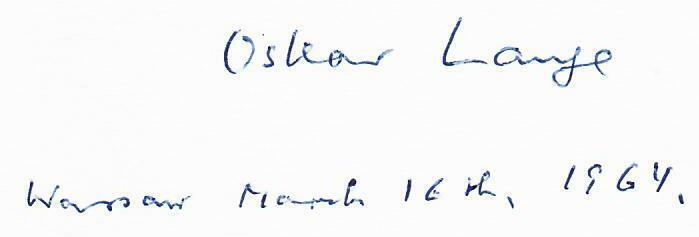When you click on links to various merchants on this site and make a purchase, this can result in this site earning a commission. Affiliate programs and affiliations include, but are not limited to, the eBay Partner Network.
Up for sale a RARE! "Polish Economist" Oskar R. Lange Hand Signed 3X5 Card Dated 1964.
ES-2432
Oskar
Ryszard Lange (27 July 1904 – 2
October 1965) was a Polish economist and diplomat. He is best known for advocating
the use of market pricing tools in socialist systems
and providing a model of market
socialism. He responded to the economic calculation problem proposed by Ludwig claiming that managers in be able to monitor supply and
demand through increases and declines in inventories of
goods, and advocated the nationalization of
major industries. During his stay in the United
States, Lange was an academic teacher and researcher in mathematical economics. Later in socialist Poland, he was a member of the Central Committee of the Polish United Workers' Party. Lange was born in Tomaszów Mazowiecki as son of Julius Lange and his wife Sophie Albertine Rosner. His ancestors had
emigrated at the beginning of the 19th century from Germany to Poland.[6] He of Kraków, where he defended a doctoral
dissertation in 1928 under Adam Krzyżanowski. From 1926 to 1927
Lange worked at the Ministry of Labor in Warsaw,
and then was a research assistant at the University of Kraków (1927–31). He
married Irene Oderfeld in 1932. In 1934, a Rockefeller Foundation fellowship brought him to England,
from where he emigrated to the United
States in 1937. Lange became a professor at the University of Chicago in 1938 and was naturalized as
a U.S. citizen in 1943.
Joseph Stalin, who identified Lange as a person of leftist and
pro-Soviet sympathies, prevailed on President Franklin D. Roosevelt to obtain a passport for Lange to
visit the Soviet Union in an official capacity, so that Stalin
could speak with him personally; he also proposed offering him a position in
the future Polish cabinet. The State Department was opposed to Lange traveling as an
emissary because they felt that his political views represented neither
Americans of Polish descent nor American public opinion in general. Lange's
trip to the Soviet Union in 1944 caused further controversy, as the
newly-establish Polish American Congress condemned him and defended the
interests of the London-based Polish government-in-exile. Lange returned to the United
States at the end of May and met, at Roosevelt's request, with Prime
Minister Stanisław Mikołajczyk of the government-in-exile, who was
on a visit in Washington. Lange stressed how reasonable Stalin was prepared
to be (Stalin told him of the Soviet desire to preserve independent Poland
under a coalition government), and asked the State Department to put pressure
on the exiled Polish leadership to reach an understanding with the Soviet
leader.
Towards the end of World War II,
Lange broke with the Polish government-in-exile and transferred his support to
the Lublin Committee (PKWN) sponsored by the Soviet Union.
Lange served as a go-between for Roosevelt and Stalin during on post-war Poland. After the war ended
in 1945, Lange returned to Poland. He then renounced his American citizenship and went back to the
US in the same year as the Polish People's Republic's first ambassador to the United
States. In 1946, Lange also served as Poland's delegate to the United Nations Security Council. From 1947 he lived in Poland.
Oskar Lange worked for the Polish government while continuing his academic
pursuits at the University of Warsaw and the Main School of Planning and Statistics. He was deputy chairman
of the Polish Council of State in 1961–65, and as such one of
four acting chairmen of the Council of State (a head of
state function). The bulk of Lange's contributions to economics
came during his American interlude of 1933–45. Despite being an ardent socialist,
Lange deplored the Marxian labor theory of value because he was very much a believer
in the neoclassical theory of price. In the history of
economics, he is probably best known for his work On the Economic
Theory of Socialism published in 1936, where he famously economics together. In the book, Lange
advocated the use of market tools
(especially the neoclassical pricing theory) in economic planning of socialism
and Marxism. He proposed that central planning boards set prices
through "trial and error", making adjustments as shortages and
surpluses occur rather than relying on a free price mechanism. Under this
system, central planners would arbitrarily pick a price for products manufactured
in government factories and raise it or reduce, depending on whether it
resulted in shortages or gluts. After this economic experiment had been run a
few times, mathematical methods would be employed to plan the economy: if there
were shortages, prices would be raised; if there were surpluses, prices would
be lowered. Raising the prices would encourage businesses
to increase production, driven by their desire to increase profits, and in
doing so eliminate the shortage. Lowering the prices would encourage businesses
to curtail production in order to prevent losses, which would eliminate the
surplus. In Lange's opinion, such simulation of
market mechanism would be capable of effectively managing supply and
demand. Proponents of this idea argued that it combines the
advantages of a market economy with those of socialist economy. With the utilization of this idea, Lange
claimed, a state-run economy would be at least as efficient as a
capitalist or private market economy. He argued that this was possible,
provided the government planners used the price system as if in a market
economy and instructed state industry managers to respond parametrically to
state-determined prices (minimize cost, etc.). Lange's argument was one of the
pivots of the socialist calculation debate with the Austrian
School economists. At that time, the view among English
socialists of the Fabian Society was that Lange had won the debate. His works provided the earliest model of market
socialism. Lange
also made contributions in various other areas. He was one of the leading
lights of the "Paretian Revival" in general equilibrium theory during the 1930s. In 1942, he
provided one of the first proofs of the First and Second Welfare Theorems. He initiated the analysis
of stability of general equilibrium (1942, 1944). His critique of the quantity theory of money (1942) prompted his
student Don Patinkin to develop his of money into general equilibrium theory. Lange made
several seminal contributions to the development of neoclassical synthesis (1938, 1943, 1944). He worked on
integrating classical economics and neoclassical economics into a
single theoretical structure (e.g. 1959). In his final years, Lange also worked
on cybernetics and the use of computers for economic
planning. The International Institute of Social Studies (ISS) awarded
Oskar Lange an honorary fellowship in 1962.









